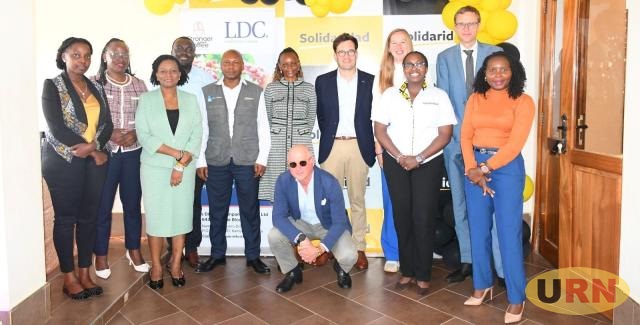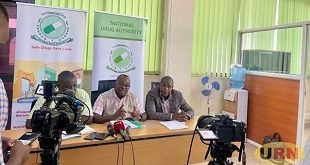
Kampala, Uganda | THE INDEPENDENT | Louis Dreyfus Company (LDC), one of Uganda’s leading international coffee buyers, has partnered with Solidaridad East and Central Africa to launch a carbon harvest scheme aimed at promoting climate mitigation and adaptation among coffee farmers. The project, funded by the Danish International Development Agency (DANIDA), began in May 2024 and was officially launched at Esella Country Resort Hotel on Tuesday. The scheme aims to train 4,500 smallholder farmers by 2027.
Benjamin Chastang, LDC’s representative, explained that the initiative is designed to offer economic incentives for countries and businesses to reduce their environmental impact. In Uganda’s coffee sector, the scheme focuses on replanting areas affected by deforestation and encouraging the use of biochar within coffee gardens, thus providing additional income for farmers.
“Farmers earn based on the amount of carbon they mitigate through tree planting and the volume of biochar they produce,” Chastang noted. Flaviah Koyesiga Birungi, the Solidaridad Uganda Project Manager, emphasized that carbon will be traded alongside coffee as a market-based solution to environmental challenges.
“We aim to increase resilience to climate change, improve livelihoods, and create carbon-free coffee. We also seek to introduce small-scale biochar production among farmers and certify over 4,500 farmers under the Rainforest Alliance and LDC RSP-Advanced standards to comply with new EU regulations on deforestation,” Birungi stated.
By 2027, the project aims to reduce 6.15 million tons of carbon, with 5.35 million tons removed using biochar and 14.5 million tons removed through agroforestry. The initiative also intends to develop a coffee traceability tool. The project has additional goals, such as increasing coffee yields by 30% among farmers, engaging 40% of women and youth in decision-making processes within coffee associations and households, and promoting better coffee harvesting and post-harvest handling practices.
Gender integration is a key focus of the initiative, aiming to empower marginalized groups such as women and youth. Dr. Catherine Odenyo Ndekera, the Regional Gender Inclusivity Advisor at Solidaridad, emphasized that the carbon harvest scheme will address gender inequalities and social norms that often exacerbate poverty.
“Gender inequality is a root cause of poverty. Women and other marginalized groups face the compounded injustice of poverty, gender inequality, and climate change,” Dr. Odenyo said. The Chief Guest at the launch, Ole Dahl Rasmussen from the Danish Embassy, praised LDC and Solidaridad for their efforts in promoting a carbon-free scheme among coffee farmers. He pledged the Danish Embassy’s continued support for the initiative, which aligns with Denmark’s environmental and gender inclusivity priorities.
Local coffee farmers have expressed enthusiasm for the scheme. Amelia Nassali, the Vice Chairperson of Mityana, noted that while the ongoing reforms in the coffee industry had dampened farmers’ spirits, the new scheme offering premium advantages has reignited hope among farmers.
Herbert Kintu, a coffee farmer, highlighted that environmental challenges, such as dry spells, have severely impacted their gardens. He called for the government to adopt and scale up such mitigation schemes. The carbon harvest scheme will initially benefit farmers in six districts: Mityana, Kiboga, Wakiso, Shema, Ntungamo, and Lwampala, particularly those supplying coffee to LDC.
Yusuf Nsubuga, a senior meteorologist at the Uganda National Meteorological Authority (UNMA), said that initiatives like this will help mitigate global warming in Uganda and the broader region. “The 2023 analysis shows an increase in warming compared to previous years, and farmers are the most affected,” Nsubuga remarked.
******
URN
 The Independent Uganda: You get the Truth we Pay the Price
The Independent Uganda: You get the Truth we Pay the Price


